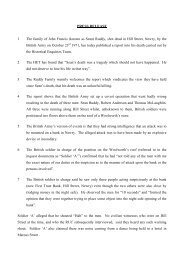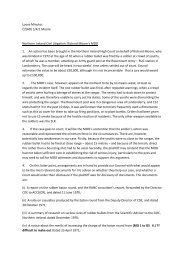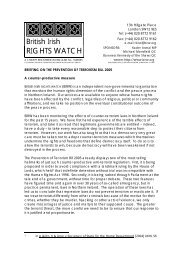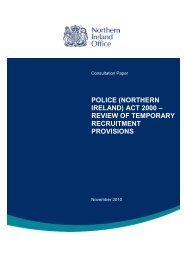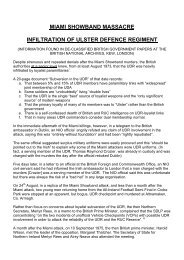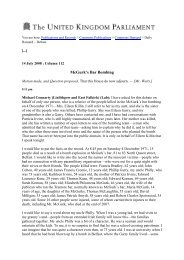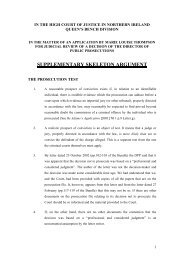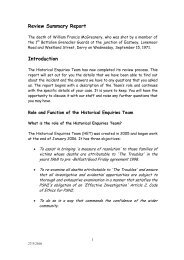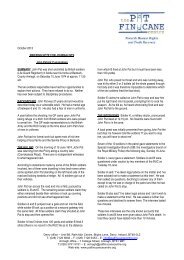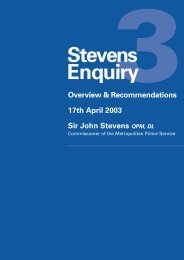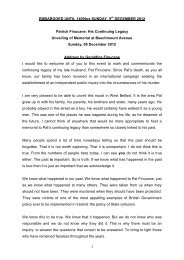Patrick Shanaghan v the United Kingdom - The Pat Finucane Centre
Patrick Shanaghan v the United Kingdom - The Pat Finucane Centre
Patrick Shanaghan v the United Kingdom - The Pat Finucane Centre
You also want an ePaper? Increase the reach of your titles
YUMPU automatically turns print PDFs into web optimized ePapers that Google loves.
16 SHANAGHAN v. THE UNITED KINGDOM JUDGMENT<br />
concluded that <strong>the</strong> Crown would be unable to establish manslaughter from<br />
gross negligence. <strong>The</strong> Lord Chief Justice noted:<br />
“Authority makes clear that a decision by <strong>the</strong> Director not to prosecute is<br />
susceptible to judicial review: see, for example, R. v. Director of Public Prosecutions,<br />
ex parte C [1995] 1 Cr. App. R. 136. But, as <strong>the</strong> decided cases also make clear, <strong>the</strong><br />
power of review is one to be sparingly exercised. <strong>The</strong> reasons for this are clear. <strong>The</strong><br />
primary decision to prosecute or not to prosecute is entrusted by Parliament to <strong>the</strong><br />
Director as head of an independent, professional prosecuting service, answerable to<br />
<strong>the</strong> Attorney General in his role as guardian of <strong>the</strong> public interest, and to no-one else.<br />
It makes no difference that in practice <strong>the</strong> decision will ordinarily be taken by a senior<br />
member of <strong>the</strong> CPS, as it was here, and not by <strong>the</strong> Director personally. In any<br />
borderline case <strong>the</strong> decision may be one of acute difficulty, since while a defendant<br />
whom a jury would be likely to convict should properly be brought to justice and tried,<br />
a defendant whom a jury would be likely to acquit should not be subjected to <strong>the</strong><br />
trauma inherent in a criminal trial. If, in a case such as <strong>the</strong> present, <strong>the</strong> Director’s<br />
provisional decision is not to prosecute, that decision will be subject to review by<br />
Senior Treasury Counsel who will exercise an independent professional judgment.<br />
<strong>The</strong> Director and his officials (and Senior Treasury Counsel when consulted) will<br />
bring to <strong>the</strong>ir task of deciding whe<strong>the</strong>r to prosecute an experience and expertise which<br />
most courts called upon to review <strong>the</strong>ir decisions could not match. In most cases <strong>the</strong><br />
decision will turn not on an analysis of <strong>the</strong> relevant legal principles but on <strong>the</strong> exercise<br />
of an informed judgment of how a case against a particular defendant, if brought,<br />
would be likely to fare in <strong>the</strong> context of a criminal trial before (in a serious case such<br />
as this) a jury. This exercise of judgment involves an assessment of <strong>the</strong> strength, by<br />
<strong>the</strong> end of <strong>the</strong> trial, of <strong>the</strong> evidence against <strong>the</strong> defendant and of <strong>the</strong> likely defences. It<br />
will often be impossible to stigmatise a judgment on such matters as wrong even if<br />
one disagrees with it. So <strong>the</strong> courts will not easily find that a decision not to prosecute<br />
is bad in law, on which basis alone <strong>the</strong> court is entitled to interfere. At <strong>the</strong> same time,<br />
<strong>the</strong> standard of review should not be set too high, since judicial review is <strong>the</strong> only<br />
means by which <strong>the</strong> citizen can seek redress against a decision not to prosecute and if<br />
<strong>the</strong> test were too exacting an effective remedy would be denied.”<br />
As regards whe<strong>the</strong>r <strong>the</strong> DPP had a duty to give reasons, <strong>the</strong> Lord Chief<br />
Justice said:<br />
“It is not contended that <strong>the</strong> Director is subject to an obligation to give reasons in<br />
every case in which he decides not to prosecute. Even in <strong>the</strong> small and very narrowly<br />
defined cases which meet Mr Blake’s conditions set out above, we do not understand<br />
domestic law or <strong>the</strong> jurisprudence of <strong>the</strong> European Court of Human Rights to impose<br />
an absolute and unqualified obligation to give reasons for a decision not to prosecute.<br />
But <strong>the</strong> right to life is <strong>the</strong> most fundamental of all human rights. It is put at <strong>the</strong><br />
forefront of <strong>the</strong> Convention. <strong>The</strong> power to derogate from it is very limited. <strong>The</strong> death<br />
of a person in <strong>the</strong> custody of <strong>the</strong> State must always arouse concern, as recognised by<br />
section 8(1)(c), (3)(b) and (6) of <strong>the</strong> Coroner’s Act 1988, and if <strong>the</strong> death resulted<br />
from violence inflicted by agents of <strong>the</strong> State that concern must be profound. <strong>The</strong><br />
holding of an inquest in public by an independent judicial official, <strong>the</strong> coroner, in<br />
which interested parties are able to participate must in our view be regarded as a full<br />
and effective inquiry (see McCann v. <strong>United</strong> <strong>Kingdom</strong> [1996] 21 EHRR 97,<br />
paragraphs 159 to 164). Where such an inquest following a proper direction to <strong>the</strong> jury<br />
culminates in a lawful verdict of unlawful killing implicating a person who, although<br />
not named in <strong>the</strong> verdict, is clearly identified, who is living and whose whereabouts<br />
are known, <strong>the</strong> ordinary expectation would naturally be that a prosecution would<br />
follow. In <strong>the</strong> absence of compelling grounds for not giving reasons, we would expect



